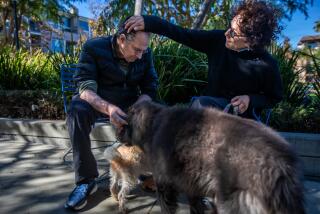More Than a Sentimental Journey
- Share via
You never heard of Fred Mendel.
I never had either until the actor, Cameron Mitchell, told me about him at a golf tournament recently.
He deserves to be known about.
You have heard of the Reader’s Digest’s “My Most Unforgettable Character” series? Fred Mendel was anybody’s most unforgettable character.
He may be my favorite horse owner of all time.
You probably think horse owners, as a breed, are great gamblers. They risk a great deal to get to see their horses run. Money, reputation. Sometimes, they put up as much as $10 million for a single stud or runner.
What if they put up their lives? What if they put up more than their lives?
What if I told you that a Jew went back into Nazi Germany’s Third Reich at the height of Hitler’s power just to see his horse run? Just on a sentimental journey.
He risked more than his life. He risked torture, typhus, barbarism, starvation, even medical experimentation. He risked, in short, being one of the 6 million victims of SS horror.
It was an act that goes beyond chutzpah. It was an act of human defiance. If it was suicidal, it was also magnificent.
The circumstances are slightly complicated. Fred Mendel was Actor Mitchell’s father-in-law. He was a man so slight in stature--4 feet 11 inches, Mitchell remembers--that he barely had room for his heart.
He came from a family that had been in Germany for five centuries. He was a meat-packer in Westphalia, but his avocations were horses and art. In the Germany of the 20’s, which was the Germany of flowers and band concerts, he owned some of the most famous horses of the day. They ran on tracks as far away as Paris and as close as Berlin.
But he correctly interpreted the sound of the jackboots and the meaning of the brown shirts before much of the rest of the German-Jewish community and escaped first to Vienna, then Budapest. It was not far enough, as it turned out, but he was a man of such daring and enterprise, Mitchell says, that he quickly adapted even to the most inhospitable of environments, and he soon had the same thriving business in Hungary that let him turn again to racing.
The Germans had not yet moved into the Balkans and put their puppets in power, but Mendel had to smuggle his wife and daughter out of Vienna when the Anschluss took place.
There was a famous race horse in Eastern Europe, Mitchell recalls, who was by way of the Man o’ War of the area. His name was Kinzham, as best the actor can recall, and he was reputed to have won 56 of 56 races.
Mendel bred a descendant of this brilliant animal, a beautifully conformed filly. He named her “Melvyn” but pronounced it “Mel-veen” and the story there is, his daughter was riding along a road in Hungary one day and saw a poster on a telegraph pole advertising the movie “Ninotchka,” starring Melvyn Douglas. She liked the name.
Melvyn the horse was a sensation. She won all 14 of her races. But, once again, Fred Mendel heard the boots coming. He had to flee, first to Australia, then, to Canada. It was while he was in New York, in transit, Mitchell says, that he got word Melvyn was going to run her last race in Budapest.
“As near as I can re-construct it,” Mitchell notes, “it was in the era between the fall of Poland and the invasion of France. The Nazis had taken over Hungary and put Admiral Horthy in power. But, my father-in-law was determined to see his little darling run one more time and, maybe, figure a way to get her out of the Third Reich, too.”
He brashly scheduled a flight through northern Italy and, against the massed protests of his family and friends, he took off. They told him he was just taking a complicated path to Auschwitz, but Fred Mendel was not a man who liked to be told what he could do.
His friends were right. The Gestapo or its Iron Guard equivalent was waiting for him when he deplaned. He was earmarked for Treblinka, Mitchell feels sure. But, Fred Mendel never went anywhere without a high hole card. “I would like to make one phone call,” he told his Nazi captors. “To whom?” they asked, trying not to laugh. “Horthy,” Fred Mendel told them.
He had said the magic word. Only “Himmler,” could have evoked such a respectful response, Mitchell recalls. “What he didn’t tell them was, it was the Admiral’s brother. This Horthy was a horseman himself and had been a friend of Fred’s. He arranged for him to see the race and then to get spirited out of the country.”
The race, reports Actor Mitchell, was pure Hollywood, right off a sound stage. “The track was a quagmire. There were 30 to 35 horses in the field. Melvyn was post position 18, and she was knocked to her knees at the start. It was a long race, and it had gone a mile before she even made contact with the last horse in the field. My father-in-law told me he put his head down and just prayed he wouldn’t start to cry.”
But the finish was right out of Black Beauty. Melvyn ran over horses at the end and won going away. Mendel left Hungary that night a happy man.
Mitchell heard the story much later after Mendel had founded a successful packing business in Saskatoon and became such a revered figure for his support of the arts that he got knighted by the Queen.
“He died in Palm Springs in 1976,” Mitchell notes. “He was the most unafraid man I’ve ever known in my life. He knew he was putting himself in mortal danger, but he wanted to show you can kill people but not their soul.” One of his last acts, reports Mitchell, was to restore the Jewish cemetery in his ancestral home that had been uprooted by the Nazis and put the names of everyone from the area who had died in the camps.
“Jews have a word for him,” says Mitchell, “a mensch. “ The rest of the world does, too: a man.


